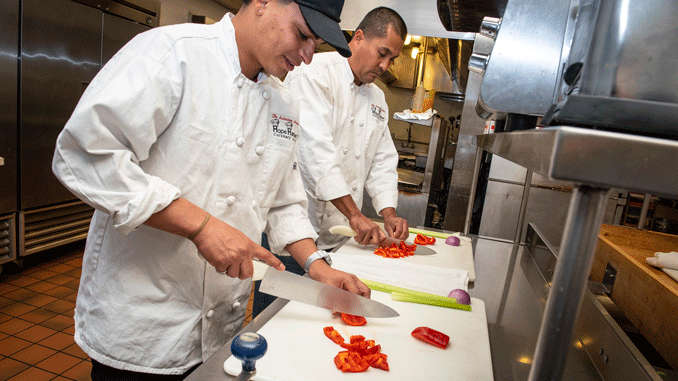
One of our favorite local charities, the Salvation Army, is in the business of changing lives. The Lodi facility is home to the first Work Force Development program in the nation, also known as the Culinary Arts Training Program—and it’s a game changer for attendees who are looking to get their life back on track.
The Salvation Army Culinary Arts Training Program (CATP) began in January of 2008 and was designed by Delta College’s own Chef John Britto. The initial plan was for the course to be taught by Chef Barry Crall. But the program was in its infancy. “At that time, I asked if Chef Britto would teach with me as a mentor,” said Crall. “Although I had been in the restaurant business as a chef for thirty years, I felt I needed guidance with the administrative aspects of the course.”
The 16 week-long course runs up to two classes a year, with the ability to serve ten students per class. But the CATP isn’t your ordinary program with mediocre results. To date, the culinary program boasts a graduation rate of 92 percent working students, with 79 percent of graduates working in restaurants. According to Crall, food plays a major role in the rehabilitation of students. The course begins with a focus on food history and classic cuisine. The group then forms a brigade, which leads to the modern restaurant and menu development. Then the students focus for two weeks on The National Restaurant Association’s Serv Safe managers food safety certification, which is crucial to working in a professional kitchen.
Only then is the attention directed toward the food as the students are immersed in the culinary world for six weeks, assuming the roles of chef, sous chef, and support cooks within the team. They learn to follow direction and recipes. They learn to be responsible not only for class work, but also for themselves. “Getting up, personal hygiene, clean uniform and time management sills, are a huge part of the learning curve,” Crall says. “And all the while, our students are learning kitchen etiquette, vocabulary, and knife skills.” The coursework makes its way through six cooking techniques integral to a chef’s longevity. The class keeps up a rigorous schedule loaded with culinary techniques including salads and dressings, sandwiches, stocks or soups, mother sauces, breakfast items, vegetables, and starches.
One of the highlights of the program is the on-the-job training to cater a plethora of philanthropic fundraisers. The CATP provides the food for the Kettle Ball Kick Off, the SA Annual Lobster Boil, and the SA Annual Dinner. Through the years, Festa della Donna was a major source of the program’s on-site training, and with the return of the long-loved fundraiser, Crall hopes to use it to continue to inspire students through the community.
As the flagship model for Salvation Army charities across the nation, our local Salvation Army has played an influential role in the development of similar programs in our region. “Lodi is home to the original CATP and the first of its kind in our region for The Salvation Army,” says Crall. “I have been a consultant and/or advisor with the duplication of this program in both the Sacramento and Napa regions.” The culinary program is even part of the invaluable Salvation Army Emergency Department Serves program and has been called upon to go onsite and provide food at the canteens for firefighters in the devastating Napa fires as well as emergencies in Stockton. More than once the program has been asked to cook food on site at the shelter to be transported to the fires for our neighbors in need.
If your ask Chef Crall what this program means to him, you will hear a man determined to fulfill his own destiny. “This program is the reason I am here on this earth,” Crall says. “I know this Culinary Arts Training Program is in me, it’s my life, it’s my purpose. And it’s an enormous blessing. I am so grateful for the opportunity to make a difference in these individual’s lives, and to play a small part in helping people turn their lives around to get back on their feet.”

